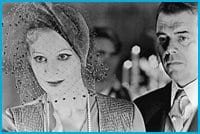
PERVERSE DESPOTISM. The Damned starring Ingrid Thulin and Dirk Bogarde.
It has been only four years since Cinematheque Ontario’s last retrospective of gay Italian auteur Luchino Visconti, but his films are of such towering aesthetic stature that they demand to be seen on the big screen more than once. Mythic and decadent spectacles that are ornate beyond belief, Visconti’s films are super-stylized powder-kegs of emotion. An aristocrat turned communist, Visconti’s critical realism brought the splendour and the expressive powers of 19th-century art forms like the novel, opera and theatre (which he also directed) to bear on cinema, the medium of the 20th century. Visconti intensifies and heightens the visible world to a state of histrionic excess where every detail and gesture clamours for our attention. Through high artifice and raw performances he dramatizes individuals caught up in the machinations of history.
The ferocious Rocco and His Brothers from 1960 (screening at 7pm on Sat, Aug 23) is my personal favourite, a moody, visceral and sublimely passionate melodrama about the disintegration of the Parondi family after mama and sons arrive in Milan from the impoverished rural south to find a better life. Several of the brothers adapt and function in this strange modern metropolis, but not the brutish Simone and the kindhearted Rocco (the gorgeous Alain Delon) who tries to save him, and their intertwined paths of devastation tear the screen apart. Visconti lent a hysterical intensity to the doom-laden proceedings that shocked audiences, particularly in depicting Simone’s rape and later murder of Nadia, who rejected him and fell in love with Rocco. Visconti’s characters are bigger than the stale and safe place modernity offered to them, their feelings too emphatic and their actions too explosive to be assimilated into civil society.
Visconti again brought psychosexual overtones to the theme of familial breakdown in The Damned from 1969 (7pm, Aug 13), a grotesque colour spectacle about the degeneration of a wealthy German industrialist family during the chaotic early years of the Nazi era (the fiery Essenbeck steelworks are an appropriately infernal metaphor for the hell coming into being — particularly as the film is inaugurated by the Reichstag burning). Of course damnation has never appeared so opulently choreographed as the scheming Essenbecks indulge in all manner of murder, betrayal and toadying to gain control of the company, all from the comfort of the lavish mansion that dwarfs them in shot after shot.
With the slaughter of patriarch Baron Joachim, the steelworks fall into the hands of Martin, his effeminate, feeble-minded young grandson (a simultaneously stunning and skin-crawling Helmut Berger). The slyly ambitious Frederick (Dirk Bogarde) and his Lady Macbeth-like fiancée Sophie (also Martin’s mother) grasp for governance, fighting off Konstantin — a pugnacious, vile SA member, the archetype of the fat old Nazi. Meanwhile the steely and calculating SS man, cousin Aschenbach, plays everyone against one another. Visconti is fascinated by the pageantry of power and wealth, and he finds perverse delight in staging this dynasty’s self-destruction as it hungrily suckles all the riches it can from the teat of the Third Reich.
The Damned offers a nightmarish and prescient vision of the collusion of capitalism and despotism in times when anything is possible and everything is permissible (think of the “Year Zero” inaugurated by America’s invasion of Iraq). The whole gruesome pact between the ruling class and Hitler is summed up perfectly by Sophie who says, “Don’t worry about tomorrow.” Perhaps unexpectedly, like many of Visconti’s films, The Damned portrays queers as wanton and corrupt: the Nazis here are inveterate sex deviants. The feckless drag queen and paedophilic young Martin ends up raping his mother in a monstrous act of revenge, and soon ends up a pretty wooden SS puppet. Then there is the film’s most notorious passage, a Grand Guignol take on the Night of the Long Knives, when the SS exterminated a number of SA men at a hotel in Bad Wiessee in 1934. Visconti delivers an extended scene of drunken, debauched homo hedonism complete with skinny-dipping, cancan boys, man-on-man slow dancing and orgiastic shenanigans before revelling in the bloody spectacle of their mass execution. The piles of terrified naked male bodies splattered with red paint are nothing short of chilling.
Dirk Bogarde collaborated again with Visconti on Death in Venice in 1971 (7pm, Tue, Aug 5), a film of interminable longing glances set to the music of Mahler, soul-shattering voyeurism in the time of cholera. Sweating profusely as he did in The Damned, Bogarde plays (another) Aschenbach, a prissy, priggish composer with a weak constitution sent from Munich to a luxury beach resort in Venice at the turn of the last century. He is a man of the mind, an artist-intellectual, terrified of desires that he cannot control and of his own body. Clouded in the thick, sleepy miasma of a decaying city, the film charts Aschenbach’s existential crisis after he spies a beautiful Polish teen named Tadzio. While they never speak, the sylphlike, social and uninhibited Tadzio is the embodiment of youth and beauty for the isolated, frail old man and all of the messy corporeal hungers Aschenbach has heretofore repressed. Naturally, as he gives in to the boy’s sensuality, he loses his self-control and becomes afflicted with the “Asiatic” cholera, crippled by fear and convulsing with frustrated yearning. By film’s end Aschenbach has received a ridiculous makeover — his hair dyed, his lips rouged, his face whitened like a corpse (which echoes the deranged Sophie’s visage in the finale of The Damned) — and becomes a painted lady, undignified and tartish, brought low by his brush with Eros. He finally dies — it’s not a spoiler, it’s in the title — in a paroxysm of lusty excitement and queasy exhaustion as he watches Tadzio wrestle with a male companion.
Bogarde camps it up to the extreme, investing every stare, swoon and simper with an intense degree of affectation, but such excesses are appropriate. In fact Visconti’s camera ostentatiously zooms into shots as if mimicking Aschenbach’s neurotic, infatuated gaze, and the director’s eye for ornament and detail is as fussy and fastidious as his protagonist is.
Finally, be sure to check out the widely acknowledged summa of the director’s career, the four-hour epic Ludwig (7pm, Aug 15), about the homosexual, Wagner-loving “mad” King of Bavaria, a majestic figure whom Visconti clearly identifies with. Starring his lover Berger as the temperamental aesthete, Visconti’s rich, flamboyant colossus hoists his grand themes onto a royal stage.

 Why you can trust Xtra
Why you can trust Xtra


